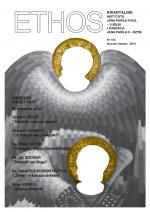 zobacz powiększenie | DOI 10.12887/27-2014-1-105-09 Fr. Jan SOCHOŃ – Sanctity without God? Cena brutto: 7,00 PLN |
|
In the present article I argue that the category of sanctity, which is of strictly religious provenance, remains open to the conditions and existential shades of a given time for each epoch adopts and accepts particular ideals which reflect its religious emotions and shades of sensitivity. Nevertheless, sanctity is always a special challenge since – as it is pointed out in the Old Testament traditions – only God is holy: the category of holiness applies exclusively to him. The principle in question safeguards human religiousness and secures it against subjectivization and manipulation resulting from various short-term interests of both individuals and social groups, the rulers and the ruled alike. Jean-Paul Sartre’s book about the writer Jean Genet is entitled Saint Genet. Joseph Marie Lo Duca in turn called Georges Bataille “a very beautiful and very saintly man.” What motivated those writers to use religious terms while referring to Genet or Bataille, whose works can hardly be considered model examples of religious literature? What semantic content did Sartre and Lo Duca wish to evoke in their readers by introducing the rhetoric characteristic of the confessional discourse? Is it acceptable to broaden the semantic field of concepts pertaining to the religious lexis so that the range of their denotation becomes open? In the present essay I attempt to provide answers to the above questions. I argue that sanctity still fascinates contemporary writers and serves as inspiration for them, although they reject its religious – in particular Catholic – understanding. I claim that sanctity has become an extremely capacious concept and one entangled in the tension between the spheres of the sacred and the profane, this being precisely the case in the outputs of Sade, Genet, Bataille, and Cioran among others. While they considered themselves religious persons, struggling with inward passions, they would not link their religiousness with God conceived of as person, who is in creative dialogue with the world; rather, they tended to somehow ‘balance’ in the sphere of indeterminate ‘transcendence’ and ‘sanctity’ devoid of religious faith or relation to Christ. Can such attitudes be inspirational? The writers whose output is analyzed in the present essay seem to have believed that it is. Yet one may justifiably claim that their views should rather be considered as belonging to a contagious utopia. Translated by Dorota Chabrajska Keywords: God, sanctity, erotism, transgression, religious language, religious literature, person, utopia, profanum, evil, postmodernism, spirituality Contact: Pliki do pobrania: » 105_Sochon_content.pdf | |
